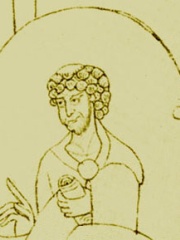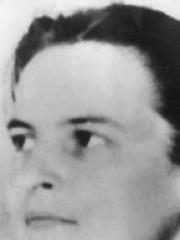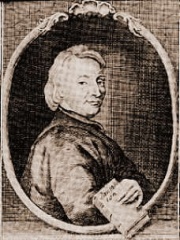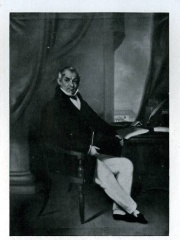





The Most Famous
PHILOSOPHERS from Ireland
This page contains a list of the greatest Irish Philosophers. The pantheon dataset contains 1,267 Philosophers, 7 of which were born in Ireland. This makes Ireland the birth place of the 27th most number of Philosophers behind Libya, and Switzerland.
Top 7
The following people are considered by Pantheon to be the most legendary Irish Philosophers of all time. This list of famous Irish Philosophers is sorted by HPI (Historical Popularity Index), a metric that aggregates information on a biography's online popularity.

1. George Berkeley (1685 - 1753)
With an HPI of 79.13, George Berkeley is the most famous Irish Philosopher. His biography has been translated into 87 different languages on wikipedia.
George Berkeley ( BARK-lee; 12 March 1685 – 14 January 1753), known as Bishop Berkeley (Bishop of Cloyne of the Anglican Church of Ireland), was an Anglo-Irish philosopher, writer, and clergyman who is regarded as the founder of "immaterialism", a philosophical theory he developed which later came to be known as subjective idealism. He has also been called "the father of idealism" by German philosopher Arthur Schopenhauer. Berkeley played a leading role in the empiricism movement and was one of its pioneers. He was among the most cited philosophers of 18th-century Europe, and his works deeply influenced later thinkers such as Immanuel Kant and David Hume. In 1709, Berkeley published his first major work An Essay Towards a New Theory of Vision, in which he discussed the limitations of human vision and advanced the theory that the proper objects of sight are not material objects, but light and colour. This foreshadowed his most well-known philosophical work A Treatise Concerning the Principles of Human Knowledge, published in 1710, which, after its poor reception, he rewrote in dialogue form and published under the title Three Dialogues Between Hylas and Philonous in 1713. In this book, Berkeley's views were represented by Philonous (Greek: "lover of mind"), while Hylas ("hyle", Greek: "matter") embodies Berkeley's opponents, in particular John Locke. Berkeley argued against Isaac Newton's doctrine of absolute space, time and motion in De Motu (On Motion), first published in 1721. His arguments were a notable precursor to those of Ernst Mach and Albert Einstein. In 1732, he published Alciphron, a Christian apologetic against the free-thinkers, and in 1734, he published The Analyst, a critique of the foundations of calculus, which was influential in the development of mathematics. In his work on immaterialism, Berkeley's theory denies the existence of material substance and instead contends that familiar objects like tables and chairs are ideas perceived by the mind and, as a result, cannot exist without being perceived. Berkeley is also known for his critique of abstraction, an important premise in his argument for immaterialism. He died in 1753 in Oxford, and was buried in Christ Church Cathedral. Berkeley remains arguably the most influential of Irish philosophers, and interest in his ideas and works increased greatly after World War II because they tackled many of the issues of paramount interest to philosophy in the 20th century, such as the problems of perception, the difference between primary and secondary qualities, and the importance of language. Public interest in his views and philosophical ideas increased significantly in the United States during the early 19th century, and as a result, the University of California, Berkeley, the city of Berkeley, California, and Berkeley College, Yale, were all named after him.

2. John Scotus Eriugena (810 - 877)
With an HPI of 78.15, John Scotus Eriugena is the 2nd most famous Irish Philosopher. His biography has been translated into 50 different languages.
John Scotus Eriugena, also known as Johannes Scotus Erigena, John the Scot or John the Irish-born (c. 800 – c. 877), was an Irish Neoplatonist philosopher, theologian and poet of the Early Middle Ages. Bertrand Russell dubbed him "the most astonishing person of the ninth century". The Stanford Encyclopedia of Philosophy states that he "is the most significant Irish intellectual of the early monastic period. He is generally recognized to be both the outstanding philosopher (in terms of originality) of the Carolingian era and of the whole period of Latin philosophy stretching from Boethius to Anselm". He wrote a number of works, but is best known today for having written De Divisione Naturae ("The Division of Nature"), or Periphyseon, which has been called the "final achievement" of ancient philosophy, a work which "synthesizes the philosophical accomplishments of fifteen centuries". The principal concern of De Divisione Naturae is to unfold from φύσις (physis), which John defines as "all things which are and which are not", the entire integrated structure of reality. Eriugena achieves this through a dialectical method elaborated through exitus and reditus, that interweaves the structure of the human mind and reality as produced by the λόγος (logos) of God. Eriugena is generally classified as a Neoplatonist, though he was not influenced directly by such pagan philosophers as Plotinus or Iamblichus. Jean Trouillard stated that, although he was almost exclusively dependent on Christian theological texts and the Christian Canon, Eriugena "reinvented the greater part of the theses of Neoplatonism". He succeeded Alcuin of York (c. 735–804) as head of the Palace School at Aachen. He also translated and made commentaries upon the work of Pseudo Dionysius the Areopagite and was one of the few Western European philosophers of his day who knew Greek, having studied it in Ireland. A later medieval tradition recounts that Eriugena was stabbed to death by his students at Malmesbury with their pens, although this may rather be allegorical.

3. G. E. M. Anscombe (1919 - 2001)
With an HPI of 73.41, G. E. M. Anscombe is the 3rd most famous Irish Philosopher. Her biography has been translated into 41 different languages.
Gertrude Elizabeth Margaret Anscombe (; 18 March 1919 – 5 January 2001), usually cited as G. E. M. Anscombe or Elizabeth Anscombe, was a British analytic philosopher. She wrote on the philosophy of mind, philosophy of action, philosophical logic, philosophy of language, and ethics. She was a prominent figure of analytical Thomism, a fellow of Somerville College, Oxford, and a professor of philosophy at the University of Cambridge. Anscombe was a student of Ludwig Wittgenstein and became an authority on his work and edited and translated many books drawn from his writings, above all his Philosophical Investigations. Anscombe's 1958 article "Modern Moral Philosophy" introduced the term consequentialism into the language of analytic philosophy, and had a seminal influence on contemporary virtue ethics. Her monograph Intention (1957) was described by Donald Davidson as "the most important treatment of action since Aristotle". It is "widely considered a foundational text in contemporary philosophy of action" and has also had influence in the philosophy of practical reason."

4. John Toland (1670 - 1722)
With an HPI of 67.77, John Toland is the 4th most famous Irish Philosopher. His biography has been translated into 38 different languages.
John Toland (30 November 1670 – 11 March 1722) was an Irish rationalist philosopher and freethinker, and occasional satirist, who wrote numerous books and pamphlets on political philosophy and philosophy of religion, which are early expressions of the philosophy of the Age of Enlightenment. Born in Ireland, he was educated at the universities of Glasgow, Edinburgh, Leiden and Oxford and was influenced by the philosophy of John Locke. His first, and best known work, Christianity Not Mysterious (1696), opposed hierarchy in both church and state. In Ireland, copies were burned by the public hangman, and he was forced to flee the country never to return.

5. James Ussher (1581 - 1656)
With an HPI of 65.28, James Ussher is the 5th most famous Irish Philosopher. His biography has been translated into 31 different languages.
James Ussher (or Usher; 4 January 1581 – 21 March 1656) was the Church of Ireland Archbishop of Armagh and Primate of All Ireland between 1625 and 1656. He was a prolific Irish scholar and church leader, who today is most famous for his identification of the genuine letters of the church father, Ignatius of Antioch, and for his chronology that sought to establish the time and date of the creation as "the entrance of the night preceding the 23rd day of October ... the year before Christ 4004"; that is, around 6 pm on 22 October 4004 BC, per the proleptic Julian calendar.

6. William Thompson (1775 - 1833)
With an HPI of 57.40, William Thompson is the 6th most famous Irish Philosopher. His biography has been translated into 16 different languages.
William Thompson (30 June 1775 – 28 March 1833) was an Irish political and philosophical writer and social reformer, developing from utilitarianism into an early critic of capitalist exploitation whose ideas influenced the cooperative, trade union and Chartist movements as well as Karl Marx. Born into the Anglo-Irish Ascendancy of wealthy landowners and merchants of Cork society, his attempt to will his estate to the cooperative movement after his death sparked a long court case as his family fought successfully to have the will annulled. According to E. T. Craig, this decision to will his estate to the cooperative movement was taken after a visit to the pioneering Ralahine Commune. Marxist James Connolly described him as the "first Irish socialist" and a forerunner to Marx, who cited Thompson in his works as well as being an influence upon Marx's thought.

7. Philip Pettit (b. 1945)
With an HPI of 54.10, Philip Pettit is the 7th most famous Irish Philosopher. His biography has been translated into 16 different languages.
Philip Noel Pettit (born 1945) is an Irish philosopher and political theorist. He is at the Laurance Rockefeller University Professor of Human Values at Princeton University and also Distinguished University Professor of Philosophy at the Australian National University.
People
Pantheon has 7 people classified as Irish philosophers born between 810 and 1945. Of these 7, 1 (14.29%) of them are still alive today. The most famous living Irish philosophers include Philip Pettit. The most famous deceased Irish philosophers include George Berkeley, John Scotus Eriugena, and G. E. M. Anscombe.
Living Irish Philosophers
Go to all RankingsDeceased Irish Philosophers
Go to all RankingsGeorge Berkeley
1685 - 1753
HPI: 79.13
John Scotus Eriugena
810 - 877
HPI: 78.15
G. E. M. Anscombe
1919 - 2001
HPI: 73.41
John Toland
1670 - 1722
HPI: 67.77
James Ussher
1581 - 1656
HPI: 65.28
William Thompson
1775 - 1833
HPI: 57.40

